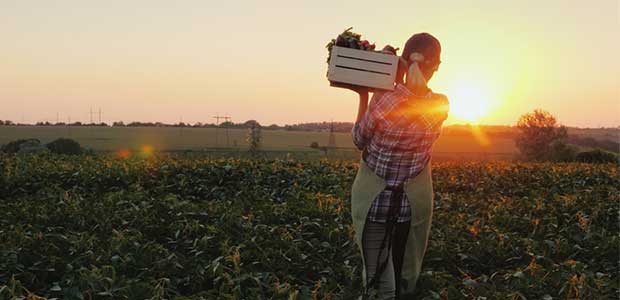
Coronavirus Offers Both Opportunities and Challenges for Farmers
The food supply chain is one area that will face many of the consequences of the coronavirus. However, opportunities arise from this situation as well.
- By Jenna Tsui
- Apr 15, 2020
COVID-19 has disrupted the ways of daily life. Economies are struggling, unemployment is skyrocketing and schools are closing across the United States. The food supply chain is one area that will face many of the consequences of the coronavirus. However, opportunities arise from this situation as well.
Online presence and supply and demand may improve during the pandemic. On the other hand, there may be food supply shortages as well as financial consequences for small businesses. During this time, farmers are going to face challenges and attempt to comply as best as they can. Areas of growth will allow them to maintain some business, but whether or not the balance will be enough is still unclear.
Online Growth
Stay-at-home orders are sweeping across the nation. Government officials are mandating that residents stay at home unless they are essential workers. Agriculture employees, like farmers and ranchers, are considered crucial. They can continue to work while maintaining proper social distancing rules.
However, since many nonessential citizens are remaining at home, e-commerce is booming. Farmers can adapt their businesses online, which helps maintain revenue.
For instance, Theiss Farms Market in Spring, Texas, has made the switch to online vending. The farm sends out a weekly email to customers that discusses the available produce. Customers can respond via email or text for their requests. Farmers then organize the orders for delivery or pickup.
Elsewhere, other farms are organizing packages for customers to choose from. Also in Spring, Texas, Three Sisters Farms is now offering assortments of vegetables, eggs and proteins in different packages and prices. Customers can select which one they want and pick them up.
These are two examples of how farmers are adjusting their needs during the era of COVID-19. It's helping customers get what they need while expanding their business practices.
Supply and Demand
Supply and demand affect farmers in two ways. First, they have to meet the needs of customers. Second, they have their own requirements for materials, parts and supplies. During this pandemic, farmers may see both areas adapting and persisting.
When faced with a crisis, people tend to stock up on supplies and food so they don't have to leave their homes for prolonged periods. This entails buying more when going out. As more people start to do this, farmers may see the need to meet higher supply and demand goals. This could drive profits upward.
For their own supply needs, farmers are counting on companies to continue providing them with important materials. For instance, manufacturers like Cat are finding ways to continue supporting farmers with farming resources and agricultural tools.
Companies are still taking orders for parts, too. They will process these orders—many of which are in bulk to last longer—and can deliver the items or make them available for pickup. This abides by social distancing while still supporting farmers.
Food Supply Shortages
Though there are unforeseen positive outcomes of the COVID-19 pandemic, there are many concerns and consequences. One of these is food supply shortages. Predominately, the coronavirus is affecting the harvesting of various crops.
Difficulty levels will depend on the type of crop. Some are simpler to harvest. For example, machinery operated by one person can take care of miles of crops like grain or carrots. However, certain fruits require large groups of people to plant and care for them—an impossible task during social distancing. Strawberries, for instance, are ripe for only a few days, and numerous workers must harvest them together. Apples, too, require large groups of people to collect them.
With certain food becoming more limited, people may start seeing an insufficient supply in grocery stores or farmers markets. This can lead to other issues, like the level of hunger around the globe.
Small-Business Revenue
Small businesses are being hard-hit by the coronavirus. Without sufficient daily activity, these enterprises must shut down. As unemployment reaches new peaks, economies are burning out.
Bigger farms may be able to handle the temporary dip in sales and production, but smaller ones may not. Online growth may help, and an increase in demand may drive profits as well. However, if e-commerce doesn't match the level of in-person business, smaller operations may have to shut down.
A similar concept applies to food supply shortages. If farms aren’t exporting as much as they used to, less revenue will come back. This leads to an inability to pay farmers proper wages. Thus, unemployment may increase, and farms may shut down. For instance, the decrease in restaurant supply has dramatically impacted farmers and their business operations.
The opportunities and challenges are going to continue to be difficult for farms to navigate. Whether or not these pros and cons are enough to balance each other out remains to be seen.
About the Author
Jenna Tsui is a Texan journalist who co-owns The Byte Beat blog. She writes about the latest news in sustainability, culture, technology and more. Check out her work on TBB or follow her on Twitter @jenna_tsui .